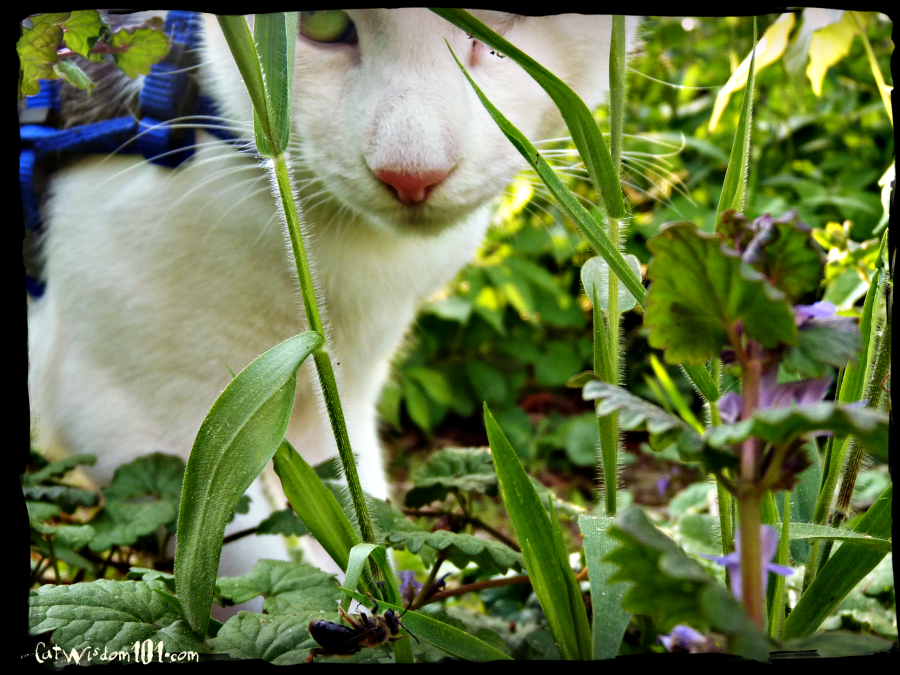
Vet 101: Helping Cats Cope With Holiday Season Stress

Our guest post is by Veterinian Dr. Letrisa Miller.
As you have probably guessed, events that are stressful for people tend to be stressful for cats too. Things like storms, visitors, and changes in routine. All of these tend to happen around the holidays. Why do our cats find these things stressful? One reason is that we find them stressful, and our cats are very attuned to us. When we are tense, our cats don’t necessarily know why, but they do know that something is upsetting us. Many cats seem to take our problems onto themselves and to worry about us. How many of us have been comforted in a dark hour by our cat? I am always amazed that these animals that hate being wet will allow people to cry on them!
Cats are often stereotyped as aloof, but really they aren’t aloof at all; they just tend to internalize their stress, signaling it in ways that are less obvious than nail biting, sleeplessness, or the other ways human beings tend to show stress.In cats a sign of stress might be a change in play or eating habits or the onset of interstitial cystitis and urination outside the litter box. Unfortunately, the latter reaction often causes further stress for their human companions, and things just get worse from there.
When we have guests in our house or move to a new place, our cats just get plain scared. Imagine being the size of a cat and having large animals (unknown humans) clomping around in your space! I think I would go into hiding too! Meeting new people is difficult for cats, and often we don’t show much sympathy for how small and vulnerable they might feel.
Moving to a new place can be even more upsetting, particularly for older female cats. Kittens are adventurous, but once a cat reaches the age of three or so years old, it starts having set territories. Female cats are often intensely territorial and have small territories. Male cats tend to have less-well-defined, larger territories. Stepping outside their territory is unthinkable to many older cats, so when they are forced to move, they might have difficulty coping. This is one reason that older cats have a harder time with visiting the veterinarian unless they go very often.
- When you have guests in your home, give your cats extra support. For example, provide a space that is all their own. If you have to move your cats, make sure they have something that smells like home or at least like you. They are likely to be scared and to need extra gentle, quiet handling.
- Some cats get overexcited, nervous and frightened and can’t seem to stay still until every crevice of a new space is explored. Others hide and won’t come out of a closet or out from under a bed.
- However they react, give your cats the space to feel comfortable, but be there to offer your familiar petting when they want or need it. Talk quietly to the hiding cat, but don’t force it out of its “safe” spot.
- The older a cat gets, the more important routine becomes. (Sounds like a lot of people, too, doesn’t it?) Events such as storms, guests in the house, holiday schedules, and moving to a new location all mean changes in our daily routine.
- Cats that are sensitive to stress may have illnesses at these times; for example, interstitial cystitis or a flare up of sneezing and conjunctivitis. Cats that have kidney insufficiency may develop a urinary tract infection because they aren’t venturing to their litter box as regularly as they should be.
- Some cats will stop eating, and some will overeat. Some of the reactions cats have to stress can be life-threatening, so any change that lasts more than a day or two should be checked out by your vet.
(Yes, trips to the vet’s office can be yet another stressful event for your cat. You can help make vet trips less stressful by gradually acclimating your cat to being in a carrier and riding in a car, using pheromone spray or wipes in their carriers, covering the carrier when outside, and by choosing a veterinarian who truly enjoys treating cats. I’m sure I’m biased, but I also strongly believe feline-exclusive practices offer a less stressful environment for most cats.)
Most cats adapt quickly to changes, but those that develop health problems should be helped. Urinary tract illness is very painful and at minimum should be treated with pain medication. Decreased eating can lead to fatty liver disease, so don’t ignore the full food bowl. Always be alert to changes in behavior in your cat during times that have an element for stress for you or your cat. Cats are very subtle beings and it is easy to overlook warning signs of illness.
Many parallels exist between stress in humans and cats. While the two species show signs of stress differently, similar stressors seem to contribute to our loads.
- Don’t forget that the visiting in-laws or grandchildren can be just as stressful for your feline companion as for the humans in the household. Watch for signs that your kitty needs some extra TLC and prepare before hand so that you can minimize Fluffy’s anxiety.
I often see critically ill cats coming from homes that have experienced recent major upheavals. Unfortunately, the people involved often heap even more stress on by blaming themselves for the illness at hand. Usually we can’t control the major stressors in our lives, but we can be aware that they can effect our cats as well as us. Perhaps veterinarians should develop a preventive medicine strategy for stressed households. Something to ponder.
In the meantime, I wish everyone a stress-free holiday season, for the sake of you and your cat!




16 Comments
Kathryn
The boys are very settled now. New hiding places and new places to watch the birds outside. And it is quiet. No loud cars or people or dogs. The other place, only a mile away, was noisy. We are all happy.
Sue Brandes
Thank you for this post. I have one kitty that gets really stressed out anytime anyone is over. He had to go to the vet so much for his eye in the last year he thinks he going everytime someone comes or puts on shoes. I will try some of the suggestions too.
Penelope at the Cat From Hell
This is a interesting post. Thanks yous!
Kisses
Nellie
Angel Abby
Very interesting informative article. Thank you so much for sharing.
Skeeter and Izzy
Stress is simply not good for anyone. I think we could all benefit from slowing down and just letting all the silly crap that we get so maxed out about go.
Thank you Dr Miller for yet another wonderful article and we sooooooooooooooooo wish that there were more feline only practices around.
Luvs Skeeter and Izzy and the Feral Gang + Peanut and Twig and Romeo >^..^<
meowmeowmans
So true! The holidays are filled with so much NON-routine. It really can be very tough on kitties.
Viki Worden
I can relate to this and my one cat Meeko can too. I have been under a lot of stress lately. My car died for one thing. Meeko is probably the most attached to me out of my 4 cats. He has always had anxiety and licking a lot, but lately he has been worse. His back end is all bare. He got a spot in the middle of his back too. The vet believes it is a combination of allergies and stress. He is on prednisone right now and I am hoping it helps him. He stays pretty much to himself when he isn’t hanging around me. He buries himself under my bed covers and stays there all night. He is older too (10) so all of these things are making me sad.
Layla Morgan Wilde
Viki, stress is no fun but having Meeko under the covers all night is a good-stress buster for both of you.
Crepes
So true! Even when the FODs are stressed, we’re stressed and we argue with each other. When they keep calm, we keep calm. Thank you for sharing this information!! – Crepes.
easy rider
Thanks for this post, I will share your hints with mom’s auntie, she has every year a problem with her cat Morris.He is totally over the top, specially when they have guests with smaller kids, probably he dislikes the noises and the hurry-scurry. It would be sad when he had to spend christmas alone in a room, hope they will find a way to make it comfy for all.
Random Felines
we tell adopters during this time to make sure the new kitty has their own space – and to let them have it to themselves when visitors come over or there is a party or whatever. and mom tries to help our fosters by taking them different places and making the carrier a safe place (heck during the last adoption event, the girls wouldn’t come out!). great article!!
Brian
Great post! Boy have we had stress this holiday season!
Katie and Cocco
Great post. We know how hard it is for cats to move. Moving them from Italy was traumatic but thankfully our recent move did not seem too stressful for them.
Sometimes, Cats Herd You
Very good advice. Ashton lives in the master closet for most of the duration that male visitors are here. That’s her sanctuary, and the peeps make sure the door to it is open during stressful times so she has a place to feel safe.
Kathryn
I forgot that females are intensely territorial and that they have smaller territories than males. It is true cats get very upset when their territory is changed. A few years ago, we moved and the boyz hid for three days. This summer, when we moved, they howled in front of me all night, on the floor, meowing at me, as if to ask, ‘WHY? WHY? ???
Two days later, they were fine. But I could tell, they are not fans of change.
Layla Morgan Wilde
K, moving it’s the hardest and they let you know! How have the boys settled in?